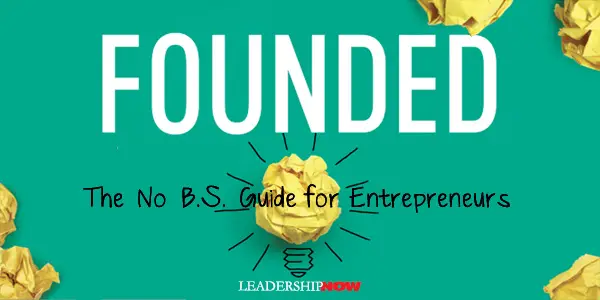 |
 |
01.24.22

Founded: The No B.S. Guide for Entrepreneurs
THE thinking required to practice entrepreneurship will serve you well no matter what you do. And it is that kind of thinking that is needed in organizations today. Succeed or fail, the process will change how you show up in the world. Melissa Kaufman and Mike Raab are serious about entrepreneurship in ways that too many schools with entrepreneurship programs aren’t. They are the directors of Northwestern University’s student entrepreneurship program, The Garage. It is a physical space and community designed to teach students an entrepreneurial mindset and skillset through experiential learning. It is a remarkable learning environment. Their book, Founded: The No B.S. Guide for Student Entrepreneurs is, as the title suggests, directed to the college or grad student. It is true, as they say, this time in a person’s life is a great time to work on an idea. “Unburdened by the responsibilities you will shoulder later in life … you’re prepared and more willing to try something totally new. There will never be a time in your life when you are surrounded by so many smart people from different backgrounds and world-class experts in a variety of fields.” And The Garage takes full advantage of that. But don’t be fooled. What they offer here is a goldmine for anyone, at any age, wanting to bring a new idea to life. They begin by making clear that entrepreneurship is not who you are but something you do. It is an activity. This means if you want to be an entrepreneur, you have to do the work. They caution, “Don’t get stuck in thinking or planning mode. Instead, focus on doing. Make a move, gather feedback, make another move.” To begin, you have to think like a scientist and share your idea with others “so you can gather feedback, improve your product or service, and repeat the process.” It is a mistake to keep your idea secret until it is ready for the market. “Until you are getting feedback from people on the basic concept, there is no reason to spend any time on it.” The best founders have “strong convictions, loosely held.” What if someone wants to steal your idea? This is rare. The idea isn’t the valuable thing. But it drives some founders to require a nondisclosure agreement (NDA) from anyone they speak to. The hard reality for these individuals to accept is their idea, in itself, is worthless and that it is almost guaranteed to not be an original or unique one. NDAs are a nonstarter for investors. Why? A founder who asks an investor to sign an NDA fundamentally misunderstands what their job is. Their job is not to have an idea; it is to execute that idea. No matter what your idea is, there are likely many other people working on something similar. Venture capitalists choose which companies to invest in based on which team they think has the highest potential to execute on their vision, not which team had the idea first. You know you are on to something—product-market fit—the authors say, “when growth is not your biggest problem; keeping up with demand is.” They cover the three biggest mistakes that first-time founders make: First, giving up too easily. Second, building something no one wants (“Your initial idea is not going to be exactly the one that people want.”). And third, ignoring distribution—getting your product in front of customers. Finding the right cofounder can make all of the difference. “When you choose a cofounder, you’re committing to a very big adventure together full of very high highs and very low lows.” Get a founder’s agreement in writing early on when things are going well. Include responsibilities and equity. “We recommend that you split up 90% of your equity up front between cofounders. The other 10% can be reserved for future hires and other circumstances.” Part two of the book is full of ideas, tips, and how-tos to get you grounded and headed in the right direction. They cover everything from evaluating ideas to business models, customer acquisition, building a team, pitching your company, pivoting, and understanding financials, to name a few. This book is one of the best books you could read as you think about your first startup because it lays out the realities of starting a business in a very concise, straightforward manner. They close with this thought: Although it is true that the vast majority of startups eventually fail, we hope you have seen through some of the stories that we’ve shared that the experience, knowledge, relationships, and stories gained through practicing entrepreneurship are more powerful than any other job or experience you could have. You’ll never see the world in the same light, and you’ll always be looking for the next opportunity to help others solve a problem and make your own dent in the world.

Posted by Michael McKinney at 07:25 AM
|
BUILD YOUR KNOWLEDGE
 

How to Do Your Start-Up Right STRAIGHT TALK FOR START-UPS 
Grow Your Leadership Skills NEW AND UPCOMING LEADERSHIP BOOKS 
Leadership Minute BITE-SIZE CONCEPTS YOU CAN CHEW ON 
Classic Leadership Books BOOKS TO READ BEFORE YOU LEAD |